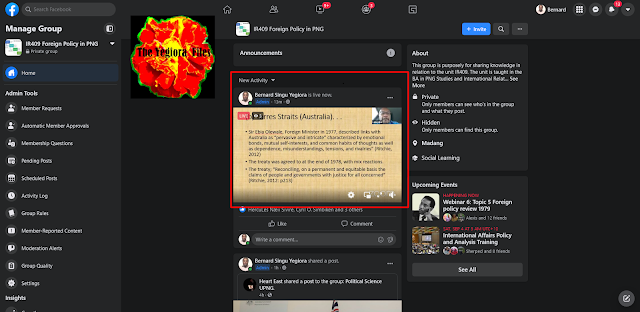Influence of Michael Somare on Papua New Guinea's First Foreign Policy
Michael Somare, a prominent leader, played a significant role in advocating for Papua New Guinea's independence. His efforts came to fruition when the country achieved independence. However, it is worth exploring whether Somare also contributed to the formulation of the nation's first foreign policy. Additionally, this article seeks to identify other key decision-makers involved in shaping the policy of universalism, known as "Friends to all, enemies to none."
According to Gedare, the policy of universalism was expressed through statements made by Somare and Albert Maori Kiki between 1973 and 1975. Although Gedare does not delve into the details of Somare's influence, he focuses on the rationale and outcomes of the policy.
During the self-governing era, seminars, discussions, and debates took place among politicians, scholars, and advisers to determine PNG's future foreign policy, as mentioned by Mitna. While Maori Kiki's involvement was highlighted, Somare's role was not explicitly mentioned.
Premdas sheds light on the power dynamics between the "radical" and "pragmatic" elites, with Somare leading the "pragmatic" faction in the House of Assembly. Additionally, Premdas provides insight into Somare's involvement in the formulation of the first foreign policy. He references a seminal speech delivered by Somare to the Australian Institute of International Affairs in April 1974, where he articulated the objectives of the policy. Somare expressed a desire to avoid perceptions of neo-colonialism or dependency on Australia.
Somare's speech emphasized diversifying aid resources and forging ties with countries like New Zealand, the United States, Japan, Great Britain, and other European nations. His objective was to establish trade links, secure technical assistance, and encourage foreign investment. This speech aligns with the policy of 'Friends to all, enemies to none' by promoting diversified relations and reducing dependence on Australia.
Under Somare's leadership, the Ministry of Foreign Relations and Trade announced an increased focus on trade with the People's Republic of China. This move was seen as a potential source of affordable products for PNG and a lucrative market for its exports.
Somare's personal experiences during the independence era also influenced his perspective. He reflected on being assigned a serial number instead of a name during his school days, the limitations on his rights, and the imposition of opinions by colonial administration. These experiences contributed to his desire for an independent foreign policy.
Wolfers and Dihm highlight the uniqueness of PNG having a foreign policy in place at independence, although they do not mention Somare's specific role. Griffin's book, which contains the proceedings of a seminar conducted at the University of PNG, explores the development of the first foreign policy. Somare, as Chief Minister at the time, acknowledges the government's focus on urgent domestic issues rather than foreign policy.
In his speech during the seminar, Somare discusses the importance of diversification and seeking assistance from other development partners. He emphasizes the need to move away from solely relying on Australia and encourages PNG to explore other trading opportunities and sources of foreign aid.
These various sources suggest that Somare indeed played a role in influencing Papua New Guinea's first foreign policy. His participation in the foreign policy seminar and his speech to the Australian Institute of International Affairs demonstrate his understanding of foreign policy and his vision for the country.
While Somare's contributions were significant, it is important to acknowledge the involvement of other influential figures. Politicians such as Maori Kiki, Olewale, Whitlam, and Peacock, as well as academics like Griffin, Sundhaussen, and Millar, also played a role in shaping the first foreign policy. These individuals, affiliated with institutions like UPNG and the Australian Institute of International Affairs.

Comments
Post a Comment